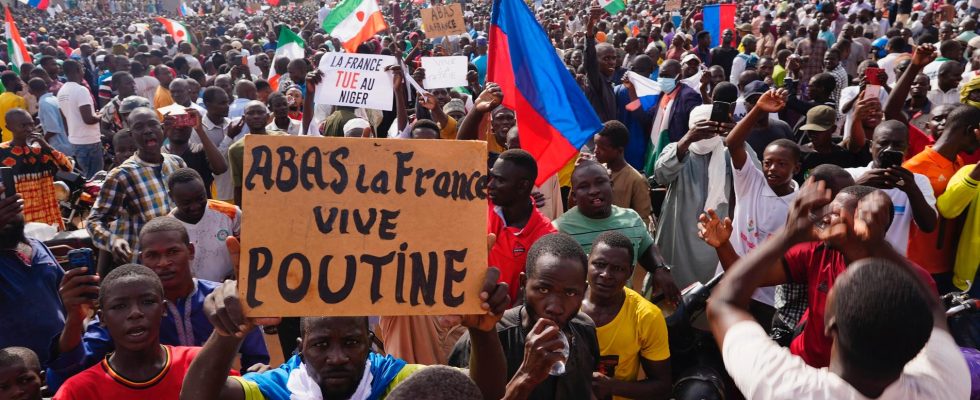full screen
Next
Demonstrators with Russian flags during a march in Niger’s capital Niamey in support of the coup plotters who seized power in the country last week.
1 / 2Photo: Sam Mednick/AP/TT
Europe’s steady supply of nuclear fuel from Niger could be cut off after the coup.
It risks increasing dependence on Russian uranium – and making new EU sanctions against Moscow more difficult, according to an expert.
The military takeover in Niger last week has been met with strong condemnation from the EU.
And not least from Paris.
France has around 1,500 troops in Niger and has enjoyed close military cooperation with ousted pro-Western president Mohamed Bazoum.
Beneath the surface there are also significant financial interests.
About 15 percent of the uranium used to power France’s nuclear power plants comes from mines in the former colony. But the new military government in Niger has announced that the long-standing uranium export to France is now to be stopped.
Long-term consequences
The state-owned French energy company Orano states that so far their operations continue as usual. And the energy ministry in Paris says it sees no immediate risks of nuclear fuel shortages. The uranium can be bought from other countries and the French stocks should last for two years, they assure.
– There may be rising prices for uranium in the future, which may be noticeable, says Phuc-Vinh Nguyen, energy expert at the Jacques Delors Institute in Paris, to TT.
– And in the longer term, we may be forced to turn to new partners. But I don’t think it causes any major problems.
However, the coup in Niger could mean problems for Europe’s uranium supply in the long term – at the same time that several European countries are increasing their nuclear power production.
Niger is the world’s seventh largest uranium producer and accounted for about a quarter of the EU’s total imports of natural uranium in 2021. Almost as much is imported from Russia.
Dominant position
After Moscow’s war of aggression against Ukraine, the EU has been anxious to phase out dependence on Russian oil and gas. But in the case of uranium, imports have continued without restrictions. Russia’s dominant position on the world market in terms of enriched uranium has made it difficult to circumvent the country.
In the event of reduced deliveries from Niger, sanctions plans will remain on the shelf.
– What the EU needs to do as soon as possible is to try to disengage from Russia and find alternatives. But it will be very difficult to do if Niger disappears as a partner, says Phuc-Vinh Nguyen.
– So this will delay EU sanctions against Russian nuclear energy.
France’s uranium mining is a charged issue in Niger. The natural resource was discovered in the 1950s when Niger was still a French colony, and after independence in 1960, France managed to secure the right to extract the deposits.
The uranium mines are located far from the capital, Niamey, in the desert areas of the north where a threat has been the jihadist groups that French soldiers have helped Niger fight.
“Exploited all the riches”
Despite the country’s large deposits, the wealth has not reached the people. Niger has remained one of the world’s poorest and least developed countries.
Anger against uranium mining has also been sparked after reports that dumped radioactive waste may have poisoned local residents.
Following the coup in Niger, anti-French protests have erupted and demonstrators have been seen waving Russian flags. Assessors are speculating whether Niger will follow the example of neighboring Mali and expel the French forces, turning instead to the Russian paramilitary Wagner group for military cooperation.
– I’m for Russia, I don’t like France, says a businessman from the town of Zinder to the BBC.
– They have exploited all the wealth in my country, such as uranium, oil and gold, while the poorest Nigerians cannot afford to eat three meals a day.
FACTS
The West African country, which is two-thirds desert, is one of the world’s poorest.
Half of the country’s 26.2 million inhabitants live in poverty.
Niger has suffered from chronic political instability since it gained independence from France in 1960.
During its independence, the country has suffered four coups d’état, most recently in February 2010 when the then president Mamadou Tandja was overthrown.
The country’s first ever democratic transition of power took place in 2021 when Mohamed Bazoum was elected president after his predecessor resigned voluntarily.
Like neighboring Mali and Burkina Faso, Niger is struggling with a jihadist insurgency that started in Mali in 2012 and spread across borders
Read more
